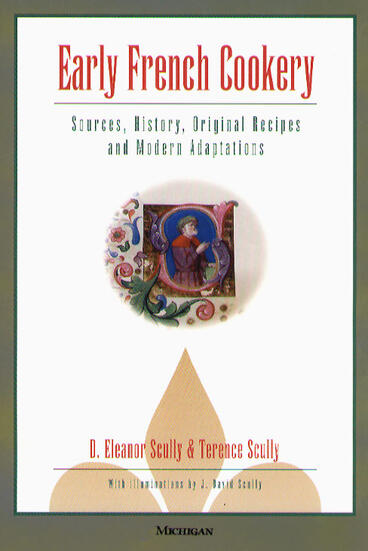Early French Cookery
Sources, History, Original Recipes and Modern Adaptations
A delicious introduction to the food prepared in wealthy medieval French households
Description
Early French Cookery introduces the general features of the food prepared for wealthy French households at the end of the Middle Ages. The volume presents over 100 recipes, drawn from actual medieval manuscripts, together with preparation instructions. The authors help place these enticing recipes in context through a short survey of medieval dining behavior, and they give practical menu suggestions for preparing simple meals or banquets that incorporate these delightfully tasty dishes.
Chapters include an overview of early French culinary traditions, foodstuffs that were used, and methods of preparation. Early French Cookery also discusses the equipment of the kitchens and dining rooms that were used, and characterizes those who prepared the food and those who consumed it.
The recipes are set out in a modern format, with quantities given in both metric and standard U.S. measurements. Recipes are grouped by category: appetizers, vegetables, fish dishes, desserts, and so forth.
Early French Cookery concludes with a fascinating look at a day in the life of a contemporary master chef at a duke's court. We watch Master Chiquart organize the purchase, storage, preparation, and serving of the food consumed by a duke and his dozens of family members, courtiers, staff and servants--and all done without benefit of grocery stores, refrigeration, labor-saving electric appliances, or running water.
Early French Cookery will be of interest to a wide variety of people, from those who like to hold unusual parties to those who are interested in the economics of the middle ages.
D. Eleanor Scully is an occasional lecturer at the Stratford Chef School and advisor to Wilfrid Laurier University on Medieval and Renaissance cooking and customs. Terence Scully is Professor of French Language and Literature, Wilfrid Laurier University, Waterloo, Ontario.
D. Eleanor Scully is an occasional lecturer at the Stratford Chef School and advisor to Wilfrid Laurier University on Medieval and Renaissance cooking and customs.
Terence Scully is Professor of French Language and Literature, Wilfrid Laurier University, Waterloo, Ontario.
Reviews
". . . this is the sort of book I have been dreaming about for years. . . . This one is monumental in that it includes no-nonsense reconstructions, full of common sense. . . . Altogether a wonderfully entertaining and delightful book that begs to take its place in the library of anyone interested not only in early cookery but also in medieval social history. . . ."
- Nicholas Michael
--Nicholas Michael, Dragon, Published by the Companie of Saint George, Switzerland
"These are rather relaxed interpretations. The recipes are designed to be executed in modern kitchens. . . . The reader will not need to learn the art of hearth cooking, and will rarely need to search for obscure ingredients. This is a book that welcomes the curious, and, as such, should bring much pleasure and some real instruction to its users."
- Barbara Ketcham Wheaton, author of Savoring the Past
--Gastronomica
"There's a lot of information here to entice and satisfy the mildly curious, the dedicated historian, the adventurous cook, or the organizer of a medieval banquet. . . . This is a very precise book, full of wonderful, enlightening, and practical detail. . . . I found myself reading with fascination one recipe after another for the advice and incidental information alone and then reading the recipe while mentally blending the ingredients to savor or discard the results. This book has a lot to offer the dedicated practitioner or the armchair cook."
- Harmonia
--Harmonia
"A scrumptious introduction to the cuisine of wealthy medieval manors revives a host of practical but delicious recipes from the Middle Ages, all adapted to the modern kitchen."
- Paper Clips, Bridgewater NJ; Forecast, Bridgewater NJ
--Paper Clips, Bridgewater NJ; Forecast, Bridgewater NJ, September 2002
". . . an excellent addition to a medieval historian's library."
- Parergon
--Parergon
"The Scullys provide a useful introduction to the culinary history of late medieval France in more ways than one. Early French Cookery is a history but it is also a cookbook intended to provide guidelines for recreating medieval feasts in modern kitchens. . . . Since Early French Cookery intends to introduce medieval foodways through the experience of them, the real proof of its value is in tasting the pudding. Recently, I organized a medieval 'tasting' session for students in our European Studies Program based on information and recipes from the book. Students and colleagues overwhelmingly proclaimed it an informative, fun, and surprisingly tasty success."
- Corrie E. Norman
--Corrie E. Norman, Sixteenth Century Journal
". . . will serve as a useful introduction to the execution of medieval French meals."
- Barbara K. Wheaton
--Barbara K. Wheaton, Speculum: A Journal of Medieval Studies, April 1999
"[The authors] explain early French cookery more thoroughly than any earlier study. . . . [The] Scullys have prepared a practical cookery book, following each original recipe with their own sensible and specific modern renditions, not being afraid to alter and criticize. . . . Early French Cookery concludes with a forty-page story, 'Chiquart's Day,' fondly narrating an imaginary 'day-in-the-life-of a late-medieval court cook' at a hypothetical castle. No lover of fantasy fiction should miss it."
- Times Literary Supplement
--Times Literary Supplement

